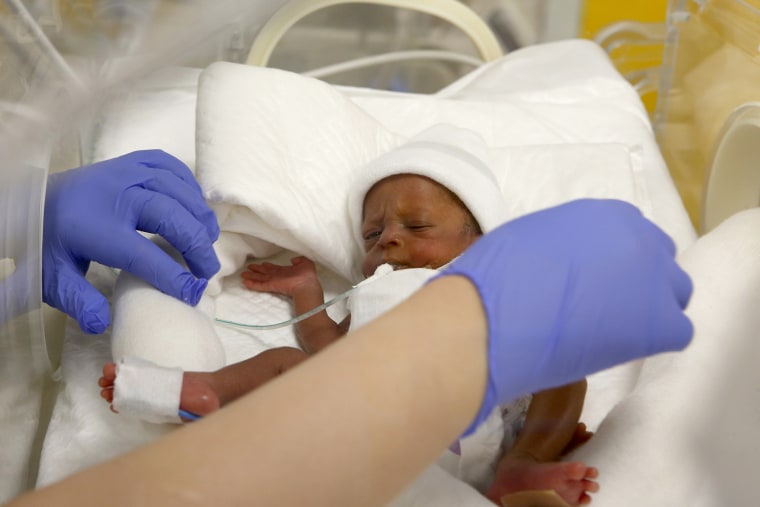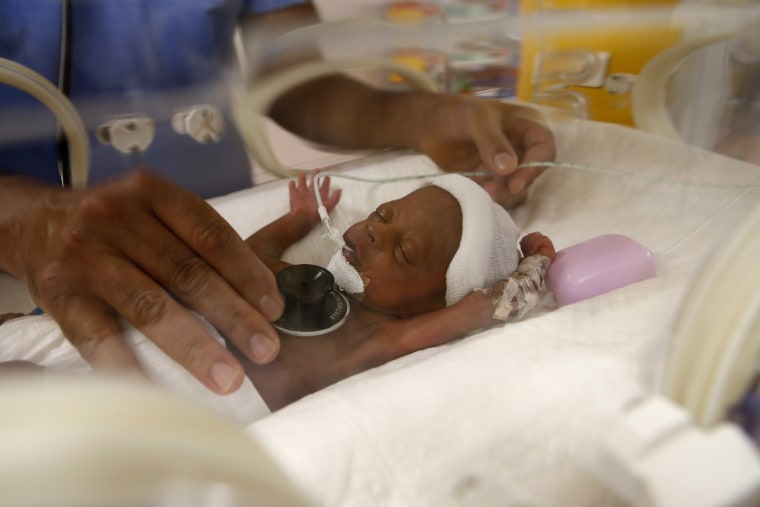The world’s only living nonuplets — that is, nine babies from the same birth — are thriving and reaching their milestones, according to their father.
"They’re all crawling now. Some are sitting up and can even walk if they hold on to something," Abdelkader Arby, the children’s father, told BBC Afrique in an exclusive interview published on the nonuplets' first birthday on Wednesday.
The siblings — four boys and five girls — are named Mohammed VI, Oumar, Elhadji, Bah, Kadidia, Fatouma, Hawa, Adama and Oumou. The nine infants also have a 3-year-old big sister named Souda.

Arby and his 26-year-old wife, Halima Cissé, welcomed the babies in Morocco on May 4, 2021. The couple traveled to Morocco from their home country of Mali in West Africa in order to receive specialized medical care.
"At the Casablanca Ain Borja Clinic, we’ve seen all sorts of complicated medical situations, but I have to say that the birth of nonuplets ... that’s a first for us," the clinic's Dr. Youssef Alaoui told TODAY Parents last year. “It’s a first for the whole world, and we’re proud to have had this extraordinary experience thanks to our medical and technical expertise.”
At the time, Alaoui said the clinic's health care workers were able to prolong Cissé’s pregnancy by five weeks, which allowed her to deliver the babies at 30 weeks. (A full-term pregnancy is 40 weeks.)
According to the Mayo Clinic, carrying multiple babies carries risks such as premature birth, gestational diabetes, high blood pressure and a necessary cesarean delivery.
In his interview with TODAY Parents, Alaoui said an ultrasound initially suggested that Cissé was carrying seven babies.
"So you can imagine our surprise when we discovered nine of them during the birth," he said. "Luckily this didn’t faze us, since we have one of the largest neonatal resuscitation services in Morocco. Our teams were ready to welcome these children into the world and able to treat them in the best conditions."
The babies, who are still being cared for by the clinic in Morocco, are all unique.
"They all have different characters," Arby told BBC Afrique, adding, "Some are quiet, while other make more noise and cry a lot. Some want to be picked up all the time."
All the activity is (naturally) quite taxing on their parents.
"It’s not easy, but it’s great," Arby said. "Even if it’s tiring at times, when you look at all the babies in perfect health, [in a line] from right to left, we’re relieved. We forget everything."
This weekend, the family will celebrate the siblings’ first birthday in a small celebration attended by clinic nurses and neighbors of the family.
"Nothing is better than the first year," Arby said. "We will remember this great moment we are going to experience."
The children also were celebrated at the time of their birth. They achieved the Guinness World Records title for "the most children delivered at a single birth to survive,” replacing Natalie (Nadya) Suleman, a.k.a. "Octomom," who in 2009 gave birth to eight children (octuplets).
These babies are the only nonuplets to survive well after their birth; other nonuplet babies have died within days. In a case that made headlines in 1971, nonuplets in Australia died within a week of their birth.
Related:
